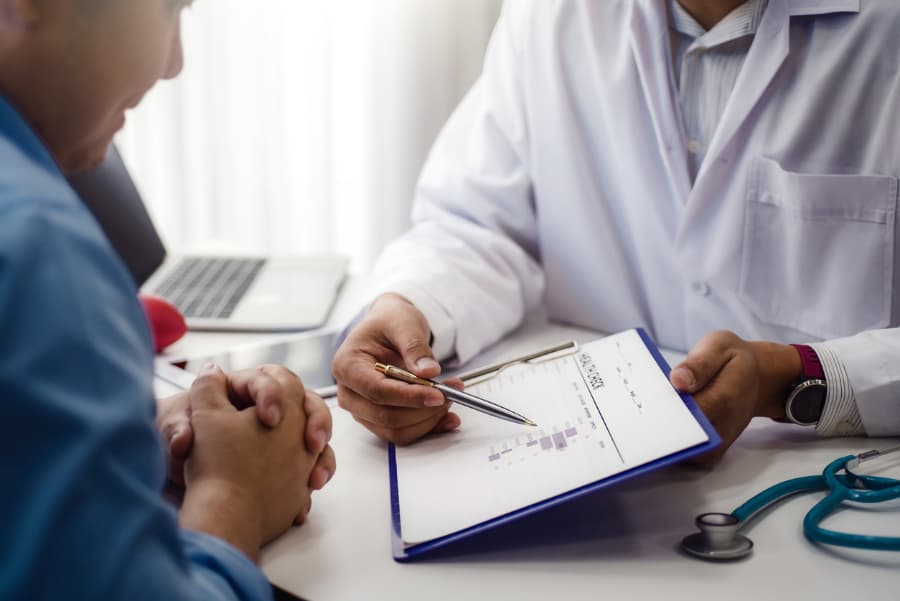Non-Hodgkin Lymphoma Diagnosis and Treatment in Connecticut, Maryland, and New Jersey
Non-Hodgkin lymphoma is a type of cancer that attacks white blood cells. While sometimes slow-spreading, it can often be aggressive.
Luckily, you don’t need to fight non-Hodgkin lymphoma alone. Regional Cancer Care Associates physicians are experienced at diagnosing and treating this disease at our facilities throughout Connecticut, Maryland, and New Jersey.

About Non-Hodgkin Lymphoma
Non-Hodgkin lymphoma, or NHL, starts in the body’s immune system. It specifically attacks the white blood cells but can arise in lymph nodes anywhere in the body. It comes in many subtypes that fall into two categories, including:
- Low-grade: Also called indolent lymphoma, low-grade NHL spreads slowly. Some types do not need to be treated right away and instead can be monitored closely.
- High-grade: Also called aggressive lymphoma, this type spreads much more quickly and usually requires immediate treatment.
Regardless of subtype, all non-Hodgkin lymphomas can move to other parts of the lymph system. If left untreated for too long, the cancer can spread to other parts of the body.
Causes and Risk Factors
In most cases, doctors don’t know the cause of non-Hodgkin lymphoma. Sometimes it is due to a weakened immune system, while other cases are attributed to past viral infections. Some identifiable factors are known to increase risk for certain individuals, including:
- Immune-suppressing medications
- Past Epstein-Barr infections
- Current or past human immunodeficiency virus (HIV) infections
- Older age, especially age 60 or older
- Exposure to weed killers and pesticides
- Family history of lymphoma
Symptoms and Signs
Patients with low-grade lymphoma often experience no symptoms at first, though symptoms may build over time. By contrast, high-grade lymphoma often presents quickly. Both types are characterized by similar symptoms, which include:
- Swollen lymph nodes
- Abdominal or chest pain
- Persistent fatigue and dizziness
- Fevers and night sweats
- Nausea and loss of appetite
- Unexplained weight loss
- Severe itching
- Increased sensitivity to alcohol
Keep in mind these symptoms are shared by other conditions. Instead of self-diagnosing your condition, speak with your primary care physician or a specialist. They can provide an accurate diagnosis and customize an effective treatment plan.
Diagnosis and Treatment
The sooner a doctor identifies non-Hodgkin lymphoma, the more likely treatment is to succeed. Diagnosis involves a range of tests, including:
- Physical exam: The physician feels for swelling in lymph nodes on the neck, groin, and armpits.
- Chest X-ray: An X-ray is taken to examine for swollen lymph nodes or other signs of disease.
- Blood count test: This test measures the balance between types of blood cells.
- Lymph node biopsy: The physician tests tissue samples from lymph nodes for abnormal cells.
- Bone marrow test: The physician analyzes a sample of marrow for abnormal cells.
Treatment of non-Hodgkin lymphoma isn’t always needed. If the condition is slow-growing, doctors may be able to monitor the condition with regular checkups. If the condition is aggressive or causes symptoms, however, treatment may be necessary. The most typical treatments are chemotherapy, radiation therapy, or a combination of both. If these don’t work, a bone marrow transplant may be an effective alternative.
Let Us Help You Fight
If you or a loved one is battling non-Hodgkin lymphoma, you aren’t alone. Our experts at Regional Cancer Care Associates are dedicated to delivering accurate diagnoses and effective treatments. To find out more or make an appointment, get in touch with us at one of our locations throughout Connecticut, Maryland, and New Jersey.
